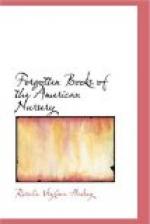But the nursery favorite was undoubtedly “Margery, or Little Goody Two-Shoes.” She was introduced to the reader in her “state of rags and care,” from which she gradually emerged in the chapters entitled, “How and about Little Margery and her Brother;” “How Little Margery obtained the name of Goody Two-Shoes;” “How she became a Tutoress” to the farmers’ families in which she taught spelling by a game; and how they all sang the “Cuz’s Chorus” in the intervals between the spelling lesson and the composition of sentences like this: “I pray God to bless the whole country, and all our friends and all our enemies.” Like the usual heroine of eighteenth century fiction, she married a title, and as Lady Jones was the Lady Bountiful of the district. From these tales it is clear that piety as the chief end of the story-book child has been succeeded by learning as the desideratum; yet morality is still pushed into evidence, and the American mother undoubtedly translated the ethical sign-boards along the progress of the tale into Biblical admonitions.
All the books were didactic in the extreme. A series of four, called “The Mother’s,” “Father’s,” “Sister’s,” and “Brother’s Gifts,” is a good example of this didactic method of story-telling. “The Father’s Gift” has lessons in spelling preceded by these lines:
“Let me not join with those
in Play,
Who fibs and stories tell,
I with my Book will spend
the Day,
And not with such Boys dwell.
For one rude Boy will spoil
a score
As I have oft been told;
And one bad sheep, in Time,
is sure
To injure all the Fold.”
“The Mother’s Gift” was confined largely to the same instructive field, but had one or two stories which conformed to the sentiment of the author of “The Adventures of a Pincushion,” who stated her motive to be “That of providing the young reader with a few pages which should be innocent of corrupting if they did not amuse.”
“The Brother’s” and “Sister’s Gifts,” however, adopt a different plan of instruction. In “The Brother’s Gift” we find a brother solicitous concerning his sister’s education: “Miss Kitty Bland was apt, forward and headstrong; and had it not been for the care of her brother, Billy, would have probably witnessed all the disadvantages of a modern education”! Upon Kitty’s return from boarding-school, “she could neither read, nor sew, nor write grammatically, dancing stiff and awkward, her musick inelegant, and everything she did bordered strongly on affectation.” Here was a large field for reformation for Billy to effect. He had no doubts as to what method to pursue. She was desired to make him twelve shirts, and when the first one was presented to him, “he was astonished to find her lacking in so useful a female accomplishment.” Exemplary conversation produced such results that the rest of the garments were satisfactory to the critical Billy, who, “as a mark of approbation made her a present of a fine pair of stays.”




